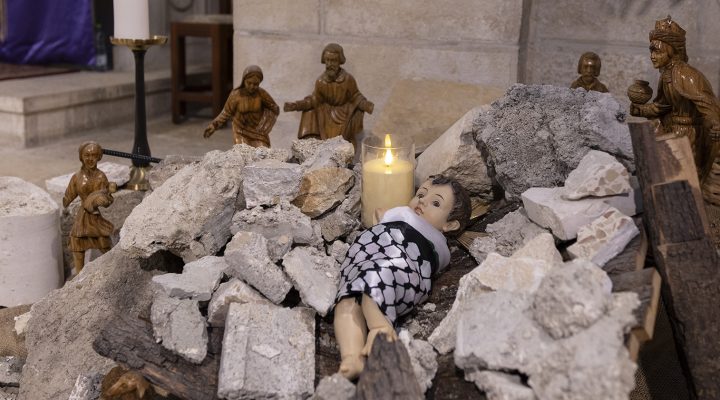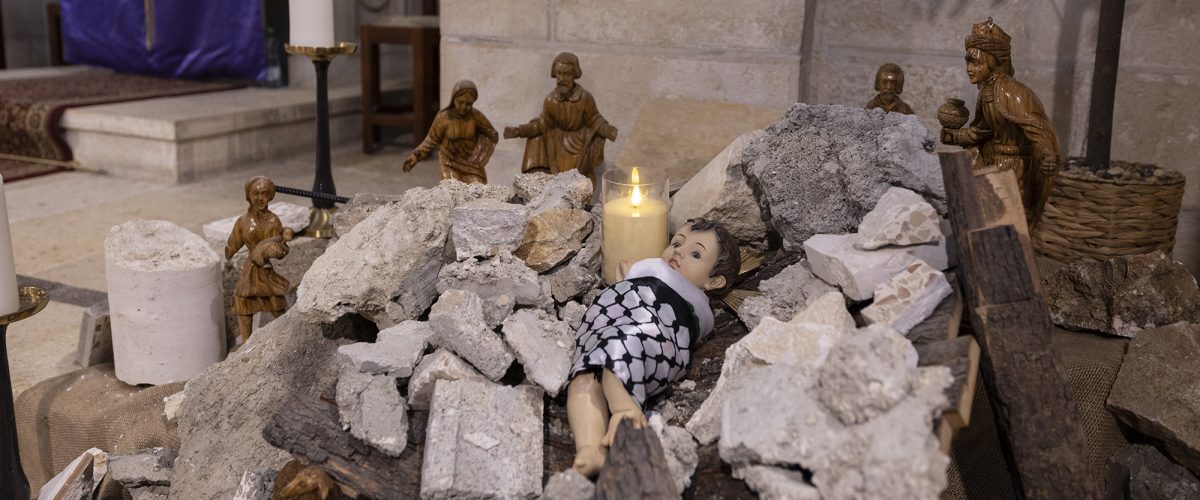How are we to celebrate Christmas this year when Gaza is being bombed, children are being murdered, and the city is being demolished into a rubble?
It is hard to fathom the immense heartbreak, horror, fear, anger, hopelessness and suffering the people in Gaza are enduring as the airstrikes continue and the death toll is now close to 20,000. During this season of Advent, we may ask, “Where is Christ during such unimaginable death, suffering and brokenness?”
Bethlehem, the birthplace of Jesus and the location of the Church of the Nativity, will not celebrate one of the most festive days on the Christian calendar. Palestinian Christians living in Bethlehem have canceled Christmas celebrations in solidarity with people in Gaza. With no traditional festivities in place, Bethlehem calls us to consider the true meaning of Christmas.

Jesse Jackson and Grace Ji-Sun Kim
Christmas is observing the birth of Jesus. However, the commercialization of Christmas has turned this into a consumer-based retail holiday with gift buying, partying, eating and family get-togethers. As retail spending, food consumption and self-indulgence rise, we have lost our grasp on why we observe Christmas at all.
Jesus was born more than 2,000 years ago in the West Bank under Roman occupation. Mary and Joseph had to travel far from their home in Nazareth to the childhood home of Joseph in Bethlehem to participate in a census ordered by Caesar Augustus, who was the founder of the Roman Empire. A census was necessary so everyone would be accounted for in order to levy taxes for the empire.
The massive influx of citizens to Bethlehem for the census meant Mary and Joseph did not find accommodations for the night of Jesus’ birth. The Scriptures say “there was no room left in the inn. So Mary wrapped the baby with cloths and laid him in a box where animals are fed.” Jesus was born under very poor conditions — there was nothing glamourous about it. Now, 2,000 years later, we have depicted the Nativity scene as holy, pure, beautiful and glamourous.
But here are some harsh realities about the time in which Jesus was born. He came into this world under the Roman Empire where people were heavily taxed. Jesus’ time in Bethlehem was cut short as King Herod was afraid of the news that another king was born and ordered all boys in Bethlehem 2 years old and younger to be killed. Mary and Joseph fled to Egypt with their child and became refugees there to escape Herod’s wrath.
Jesus was born under occupation and amid a genocide. Palestinian Christian theologian Munther Isaac states, “If Christ were born today, he would be born under the rubble and Israeli shelling.”
“Jesus’ early years were fraught with the fallout of political and social turmoil.”
Jesus’ early years were fraught with the fallout of political and social turmoil. He understood the brokenness of our world, and because he did, he did not come to be a ruler. He came to be a humble servant to his people, to heal the broken, to search for the lost. He sat with the poor, sick, lonely and broken people. Jesus identified with the masses who were in search of good news. Jesus’ mission statement was to clothe the naked, and the poor received him gladly. The powerful and the rich didn’t receive him the same way. They shunned him, disrespected him and wanted him gone. People of power and privilege didn’t like him.
As the world sees a torn-apart Gaza, we need not celebrate the holiday with festivities but rather recognize Christmas as a time of worship. Christmas comes from the phrase “Mass of Christ” and we are, as a world, to worship Christ together.
At the time of Jesus’ birth, Bethlehem was called the City of David. It is also translated as the “house of bread.” Jesus came into the world to be the “bread of life” for a broken world.
Let us remember that “holiday” once meant “holy day” and that even in death, Jesus gives us life. Come, let us worship Christ.
Jesse Jackson Sr. is an American civil rights activist, Baptist minister and politician. He is the founder and president of the Rainbow PUSH Coalition and author of Keeping Hope Alive. Grace Ji-Sun Kim is professor of theology at Earlham School of Religion in Richmond, Ind., and earned a Ph.D. from the University of Toronto. She is an ordained minister in the Presbyterian Church (USA) and the author or editor of 22 books, most recently Keeping Hope Alive, Reimagining Spirit and Intersectional Theology co-written with Susan M. Shaw.


